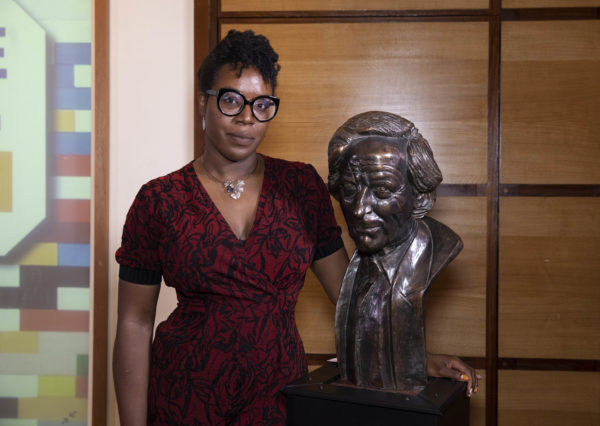
In July, Lesley Nneka Arimah received the 2019 Caine Prize, the award’s twentieth edition, for her short story “Skinned,” published in McSweeney’s Quarterly Concern‘s Issue 53. The Nigerian writer, whose debut book, the story collection What It Means When a Man Falls from the Sky (2017), won the Kirkus Prize and the New York Public Library Young Lions Fiction Award and got her picked as one of the US National Book Foundation’s 5 under 35, had previously been shortlisted for the £10,000 prize in 2016, for the title story of her collection, and in 2017, for “Who Will Greet You at Home?” A recipient of a National Magazine Award, the Commonwealth Short Story Prize, and an O. Henry Award, her work has appeared in The New Yorker, Harper’s, and Granta, and has been supported by The Elizabeth George Foundation and MacDowell. She is currently a 2019 United States Artists Fellow in Writing.
Arimah answered questions by Brittle Paper‘s Chukwuebuka Ibeh.
Chukwuebuka Ibeh:
Congratulations, Lesley, on winning the 2019 Caine Prize. How does it feel winning a landmark edition of the prize, its twentieth? How does this compare to the other prizes your stories have received: the O. Henry Award, the Commonwealth Short Story Prize, the National Magazine Award?
Lesley Nneka Arimah:
All prizes are unique in what they consider and award, so I cannot compare them in that way. I am honored to have won the Caine Prize. I am honored by any prize. It’s good to remember that nothing is owed to any writer—not prizes, not awards, not audience. These are bonuses on top of the satisfaction of completing the work.
Chukwuebuka Ibeh:
You’ve hinted in the past that your winning story, “Skinned,” was intended to appear in your collection What It Means When a Man Falls from the Sky, but didn’t because you couldn’t “get it together to make it work.” Why was it particularly difficult to write “Skinned” as opposed to the other wonderful stories in the collection?
Lesley Nneka Arimah:
“Skinned” was harder to write because it lacked the forward propulsion of the protagonist’s wants. Unlike, say, “Who Will Greet You At Home,” where the protagonist wanted a specific thing—a baby—and took action to get it. Ejem, the protagonist in “Skinned,” didn’t have a specific want to move towards that would create momentum. It made the story harder to figure out. I knew there was something there—that I eventually saw—but at the time of the collection, I realized that I need to be a better writer that I currently was to figure it out. So I shelved it and What It Means When a Man Falls from the Sky was published without “Skinned.” I returned to the story later, with a clearer eye, and this is the result.
Chukwuebuka Ibeh:
In an interview with The New Yorker, for “Who Will Greet You At Home?,” you noted that you were “taken with the idea of creating new myths that speak to our current world in the same way that old mythology spoke to the world in its creators’ time.” With that story, it was the zealous insistence of motherhood as the validation for existence. Could the same be said for “Skinned,” replacing motherhood with marriage?
Lesley Nneka Arimah:
Yes, it could. I like the idea of taking some aspect of society and turning up the volume. Placing our conventions in unfamiliar settings allows for them to be considered without the trappings that make them ordinary. It’s like taking a blue pillow from a blue couch and placing it on a red one. It’s the same cushion, but the surroundings have morphed the way it is seen.
Chukwuebuka Ibeh:
In this story, there’s also a realistic analysis of class distinction and how it affects the way the characters relate with the society. Much of it is evident in Odinaka, who is not only able to get away with being clothed while unmarried because she’s wealthy, and ironically owns over half of the world’s textile factories, but is also able to accommodate fellow unclothed women and, perhaps more outrageous, host these glamorous parties and invite diverse people while flaunting her non-conformity, aware that there was little or no consequence. Is Odinaka’s behaviour a conscious commentary on class?
Lesley Nneka Arimah:
Yes, but the class commentary goes further than just her. Like Odinaka, there are plenty of wealthy women who are able to pursue their dreams because they can hire less fortunate women to perform their mundane tasks. This isn’t a blanket condemnation of that as all work can have dignity, but often that work does not because of the way these workers are treated. More important to this discussion are the osu, reinvented in “Skinned” as a permanent underclass. Because class is more complicated than just the haves vs. the have-nots. Ejem, for example, isn’t well-situated enough to have osu women working for her—she’s not at Odinaka’s level, or even Chidinma’s—but she benefits simply by not being osu. That’s the way privilege works. It’s not just what you get, but also what you get to avoid.
I should add a caveat on the “consciousness” of this commentary. When I write, I don’t do so mechanically, checking off boxes to comment on one thing or the other. I know I wanted this story to consider class, so I varied the classes of the characters, then focused on just telling the story, letting the characters have their say, letting the logic of the world bear out. I can reverse-engineer comments like the previous paragraph after looking at the story with a critical eye, but the writing of it is less managed.
Chukwuebuka Ibeh:
We also see the dynamics of friendship between women. Among other things, I found it interesting that Chidinma becomes deeply resentful of Ejem, to the point of nearly attacking her in public, after she learns the latter had learned to be clothed without marriage. “You don’t get to be covered without giving something up. It’s not fair,” she says. I wonder if the characters in the story all think of marriage as giving “something” up. What do you the writer think about marriage?
Lesley Nneka Arimah:
You have to see the story from Chidinma’s perspective to understand her distress. She unnecessarily unclothed herself in solidarity with Ejem when she was a child. Her parents resented her for the loss of family friends/social standing. She stuck by Ejem when others would have distanced themselves. Of course she going to feel a way about what Ejem has done. But Chidinma is not the enemy here. And neither is Ejem. They are both victims of the same system. Patriarchal systems puts unique pressures on female relationships and that’s what I wanted to explore.
Chukwuebuka Ibeh:
You won the Caine Prize on your third shortlisting, your third in four years. A different writer might have given up after the second time. What made you keep entering knowing there was a real chance of only yet another shortlisting?
Lesley Nneka Arimah:
Here’s where I should probably pretend at some great inner well of persistence that would make me look good and make an inspirational story, but I didn’t know I had been submitted until they reached out to me for making the shortlist. So credit to Claire Boyle and the McSweeney’s team for being on top of things.
Chukwuebuka Ibeh:
Following your win, you urged people to read and appreciate the other four stories. What is your impression of them?
Lesley Nneka Arimah:
The other stories are marvelous. I urge again for them to be read and appreciated. The news will come in time (no spoilers!) but these writers are all enjoying robust advancements and receptions to their work. I can’t wait for you to see what they do.
Chukwuebuka Ibeh:
Could you recommend five unpublished/new/young African writers you think people should be reading?
Lesley Nneka Arimah:
Pemi Betty. (I must link her glorious just-published story here. Pemi blew me away with an earlier version at the 2018 Tin House Summer Workshop.) Ope Adedeji. Ukamaka Olisakwe. Chukwuebuka Ibeh. Samuel Kolawole.
Chukwuebuka Ibeh:
As a writer who has now thrice been in its press cycle, what do you believe to be the place of the Caine Prize in the African literary scene?
Lesley Nneka Arimah:
In general, prizes exist to award writing that the judges believe (subjectively) to be exceptional or important, based on the parameters of the award. They offer recognition and acknowledgment to the writer and a chance to have more readers discover the work. The Caine Prize held a unique space as the first of it’s kind, doing these things specifically for African writers of short stories. The prize currently goes further than most awards do, with the 10 days of curated events leading up to the announcement of the prize giving the shortlisted writers a chance to meet agents and editors in a controlled environment (no need to stalk an editor home and slip manuscripts in their mailbox), interviews and talks with interested media, and engagement with readers.
As I said earlier, awards are bonuses. Awards can serve as encouragement, as reward, as vehicle to literature, but the literary scene is ultimately upheld, enlivened and enriched by its readers and writers.
Chukwuebuka Ibeh:
You are having a dream career, Lesley, and we are rooting for you. Do you have any advice for young writers hoping to take their work to the next level?
Lesley Nneka Arimah:
Thank you! My advice for young writers isn’t anything they haven’t heard before, but I hope by repetition it sinks in: Read. Everything you’re trying to write, every language device you’re experimenting with, every structure you’re trying to pull off, etc., all these questions can be answered in a book you haven’t read yet. So read everything, both books similar to what you’re trying to write and books that are very different. Read hard books, read easy books, read all genres. Because the more you read, the more you cement what you understand about storytelling. And the more varied your reading, the more you encounter different ways that stories can be told—thus diversifying your craft—and the more you come to understand the underpinnings of storytelling that remain the same, no matter what you write.









8 Must-read Expository Interviews with Prominent African Writers - EBOquills February 20, 2020 12:33
[…] Brittle Paper Interview with the Caine Prize, 2019 Winner: Lesly Nneka Arimah: Lesley says; “It’s good to remember that nothing is owed to any writer—not prizes, not […]